When Ward left his parents’ house, two years ago, to live on his own and enjoy his freedom with his partner, he didn’t know that one day there would be a global pandemic that would provide him with the most reasonable justification, to help him avoid tiring family gatherings.
“I don’t visit you because I want to protect you and protect myself from being infected,” Ward used these words to explain to his parents the reason behind his absence. What he said carried only partly some truth, but the main reason was Ward’s need to avoid hearing his parents calling him by his old name, or experience humiliation based on his appearance, the length of his hair, the way he walks, the way he refuses to abide by any obligations of conduct that would spare him the awkward looks, doubts and useless conversations. Thus, in his opinion, insisting on living away from his family’s house was the easy way out.
Ward’s story is one of many stories of Lebanese people, refugees and foreigners that we’ve listened to. In this investigation―that sheds the light on some aspects of the lives of those destined to suffer twice―we will tell you about the experience of Simon, Adam, Khalid and Diana, to reveal to you the added costs they pay―because of their class, political and gender identity in addition to their sexuality―besides the regular costs they pay relating to health and the economic crises that have been weighing us, all, down.
The investigation also addresses the preparations of associations and response teams in meeting the humanitarian needs regarding these issues, which in truth are on the verge of exploding. However, up until this moment, these needs have not attracted the attention of any official body, and they of course were not even mentioned in the country’s plans for this critical time.
Transgender People: “We Will Cross” With Whatever Tools We Have
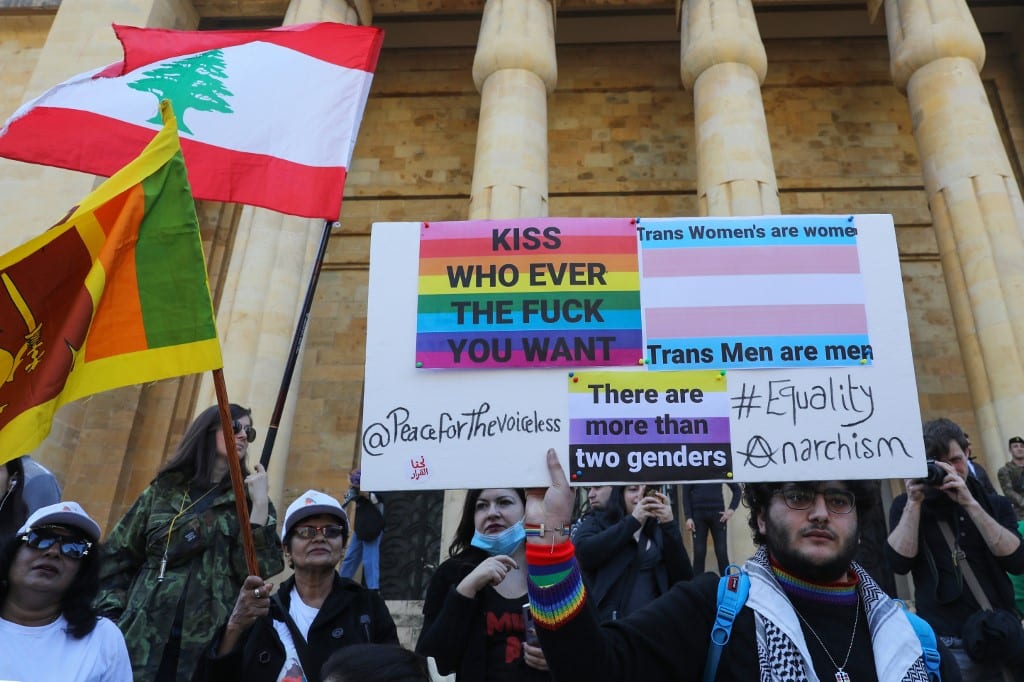
With the coronavirus spread across the world, a flood of worry swept over the minds and souls of many, who have been punished, or had their liberty restricted by their parents, because of their gender expression or their sexual orientation. The diversity of experiences is acknowledged along with their various impacts, according to the different social and economic conditions of each individual.
Some of them were forced to abide by the rules of home quarantine in houses that don’t accept their realities and choices, like Simon, who is 18 years old. Some of them have managed to live all by themselves, with a romantic partner or with a “chosen family”, i.e. friends, and face economic hardship together with the available resources like Adam and Khalid. Others were quarantined with either friendly and supportive families or with others, swinging between appeasement and arguments, or with families lost in a quaint denial phase, in which they keep painfully revisiting their precious childhood memories, or their so-called coping mechanisms.
Simon: Living With Parents is a Truce Renewed Daily
Simon, a trans-man, “who was assigned female at birth,” is living with his father in Beirut and spends his time waiting to find out the results of his last difficult school year. “A normal life is an inapplicable option to transgenders who are living in societies that don’t accept their existence and countries that do not provide them with job opportunities or independant housing and decent living. But today, our conditions are, undoubtedly, getting worse due to the impossibility of being with friends who love us, know us and accept us as we really are,” Simon told “Daraj.”
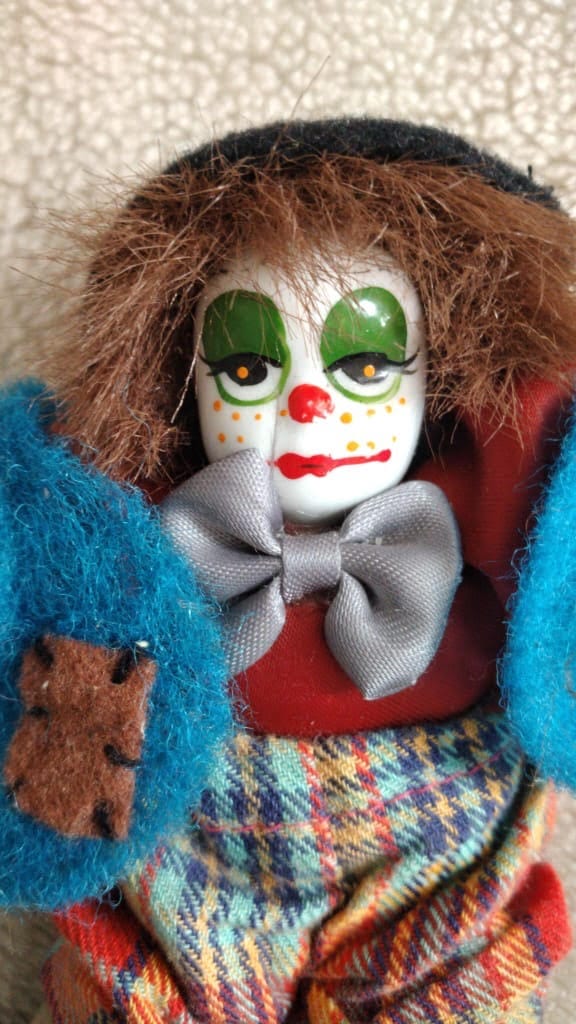

“Simon” is stuck in home quarantine with his father. “But my father is also stuck in quarantine with me, both of us are sick and tired of eachother and of the quarantine!” He told “Daraj.”
Simon is looking forward to the day when he starts studying in his favourite field in university: Forensic Medicine. However, before reaching this dream, he knows pretty well that he has another dream that seems simple but is actually more complex than it seems: that his parents stop calling him using his old female name and start acknowledging him as “Simon.”
As for ‘Ward’, the young man who prefers gender neutrality in defining himself, has become a communications officer in the “Helem Association” for LGBTIQ support to end discriminatory practices and policies used against them, i.e., against lesbian, gay, bisexual, queer and transgender people.
He, and his colleagues at the association, understood the impact of losing support networks on those who used to resort to the “Helem” social center, which was closed after the public mobilization was announced. Thus, they moved it to social media platforms and chat applications, so that those who need it never feel deprived from being connected with others, hoping that it will ease the pain and make them feel less isolated, in conditions where many suffer from social distancing and social rejection, not to mention a long list of bullying and exploitation practices.
Organizations have recorded a significant increase in the number of Lebanese calling them recently, to request support, in comparison to before Corona.
Ward and his friend Margot, who is running Helem’s social center, were behind the launch of the “We Will Cross” campaign, which mainly targets transgender people who are living with their parents, through the home quarantine period, especially those who are not accepted by their family members and thus, they are forced to hide their real gender expression.
The campaign’s target, as explained by the association activists in an interview with “Daraj,” is the empowerment of transgender people through producing text and visual material, that they create and publish by themselves, to address some of them, support the most marginalized among them, share their experiences and the way they spend their days. They are hoping that these mechanisms, ideas and contributions of “Shahinaz” and “Mama Jad,” reduce the suffering of other anonymous transgender people, who are left to suffer loneliness, depression and being unseen, especially those who are incapable, so far, of speaking up themselves for personal security reasons or fear of the exacerbation of persecution that might turn them homeless, due to clashing with their families, partners or even the surrounding environments.
Housing Insecurity is Getting Worse
Some of the LGBTIQ people are still living with their unsupportive families, while others are homeless moving from one place to another and from a friend’s house to another. They might spend their night on the street, or live in apartments or even rooms crowded with those who share their same suffering, which violates the current protective measures including social distancing.
This fact has prompted most concerned human rights organizations to consider launching emergency programs that require transfering available resources, requesting fundings and additional contributions for direct humanitarian assistance and targeting the most affected people, who no longer have income or cannot afford rent, food and medical allowances. This is noting that many of them were already suffering from their deliberate exclusion in the work field, in addition to being humiliated by apartment owners and having limited work choices, thus they resort to informal employment in the restaurants, hotels, and service sectors.
Some of the LGBT community still lives with families who are not supportive of them, others find themselves homeless without housing.
In this context, Rabal Maatouk―a programme manager in the MOSAIC Lebanese Organization which provides social and psychological support to the most marginalized communities―confirms that the percentage of new requests asking for residential and financial support has increased, noting that the organization has recorded a “significant increase in the number of Lebanese calling them recently, in addition to Syrian, Iraqi, and Egyptian callers, who had normally been reaching out.”
This note reminds us of some similar findings by Women’s Organizations in their recent monthly reports, about the increase in the number of Lebanese women using hotlines, compared to refugee women, for instance.
LGBTIQ people―just like women stuck in cycles of violence and domestic workers governed by the kafala (sponsorship) system―face many obstacles imposed by their families which prevent them from being able to freely contact supporters, often forcing them to argue that they should go to the shops or the pharmacy each time they need to make an important call.
Adam and Khaled: “The only way out is to support each other”
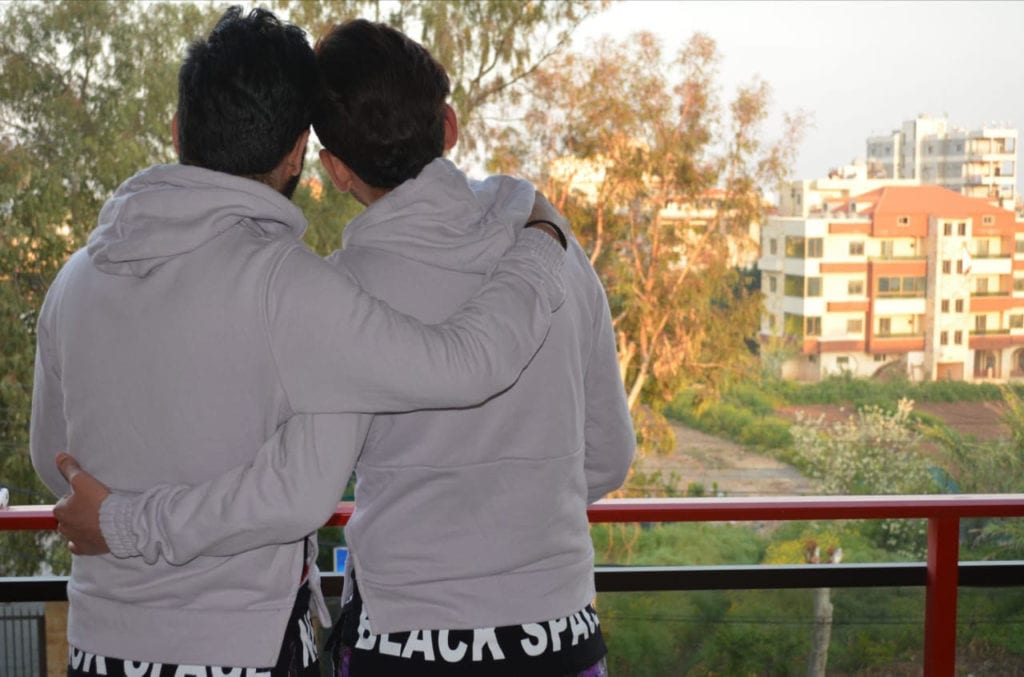

ِAdam is a 22-year-old Lebanese young man. His lover, Khaled, who is one year younger than him, had come to Lebanon from Syria as a refugee for several reasons, the most important of which was his family’s threats to him once they knew about his relationship with Adam.
Adam went through the same ordeal when his family discovered his love for Khaled. His brother threatened him using a weapon. He was forced to move from his home in a remote town in the north of Lebanon to the suburbs of the capital, Beirut.
Today, Khaled is waiting for the UN High Commissioner for Refugees to decide about his case file, so that he would be able to travel to a far place, = where Adam could follow him, to a place where they would be allowed to live freely, safely and with dignity. Their main concern now is that the commissioner may “stop approving aid disbursement and card renewals for many of those registered on its records”, which will leave more refugees, including Khaled, in a state of extreme indigence.
But despite the gloominess of the situation, Khaled and Adam did not give up, and they did not think about their own adversity alone; they shared their apartment with more than 6 Lebanese, Syrian and Egyptian people who were threatened with displacement. Two of them were expelled by the landlord of their rented apartment in Beirut for not being able to pay the rent, then later moved to another location, and the other four stayed with Adam and Khaled in the same apartment. Together, they form the alternative family model that they have always dreamed of, according to what Adam narrated to Daraj. However, they are all worried about paying the rent, as they are deprived of work and pay, except for one of them who has a job in the cleaning field.
“They always support families, not individuals.”
Today they are searching, with the associations they cooperate with, for solutions to the situation they and those who are less fortunate are facing. In their opinion, establishing safe centers to accommodate displaced people is a top priority that they wish to be given greater importance by civil society and official institutions, as well as donors.
Recently, Adam experienced a situation with some of the humanitarian organisations he visited, where he noticed how difficult their conditions for supporting others were. “They always support families, not individuals,” Adam tells us.
“I was rejected time and again, because I’m single, as if a person cannot exist except within the frame of a family that defines his existence and his relationship with the world around him.”
So, not everyone has access to a safe residence, jobs, and rent aren’t available for many residents in Lebanon, especially the LGBTIQ community, who are absent from the public debate and from relief programs that seem to be designed almost exclusively for “families.”
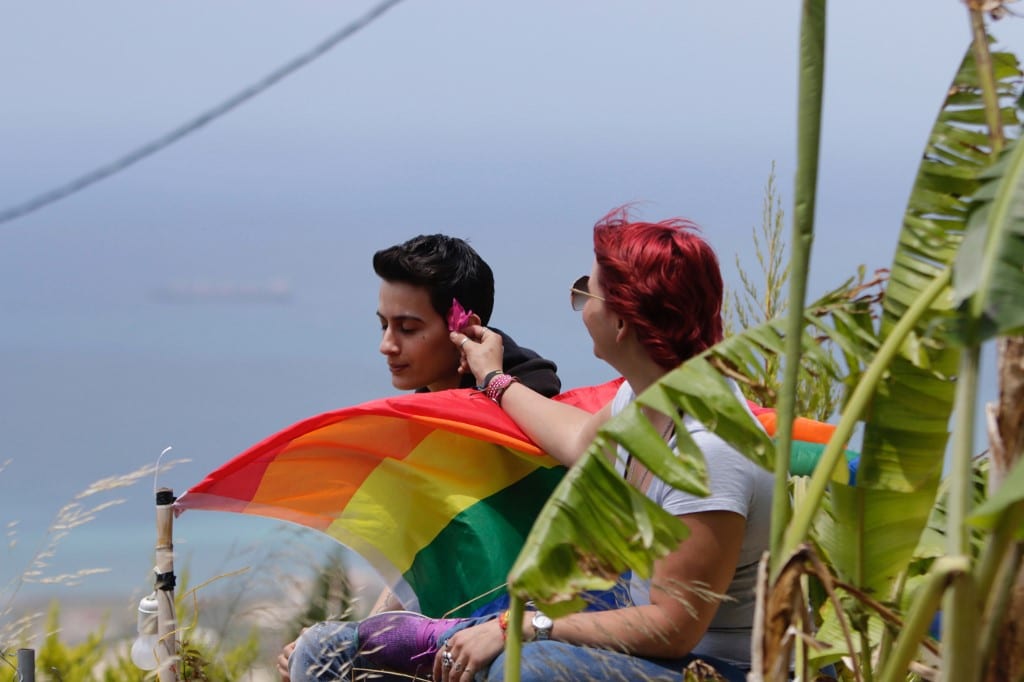

Those infected with a virus that needs special care days before the outbreak of Coronavirus
Milad Abu-Joudeh, a university professor and psychotherapist at “Marsa Sexual Health Center”, confirmed to Daraj that the people who are suffering the most now are those who were facing vulnerable conditions and discriminatory practices from the beginning. Most of them had no suitable residence nor a stable or safe job to start with. His deepest concern now is the situation of those who were recently informed, right before the pandemic and quarantine, that they were infected with HIV.
“It may seem simple to some people, but in fact it is a very difficult process: starting by preparing the file and papers, then sending them to the Ministry of Health, through bringing medicine from the Karantina region, and waiting for transportation for those who do not own a car, as well as bearing with the early stages of the discovery of the virus in the body, and the pressure resulting from the current crisis … This is what a number of those conditions suffer today after they were told that the results of HIV tests are positive.”
Psychological Support Continues Through the Phone
Abu-Joudeh, and other psychotherapists and social workers, try as much as possible to follow up remotely, through offering advice for those who seek support over the phone, and regularly, in order to maintain an “organized framework”, keep a particular “routine”, and encourage creative activities that help reduce the feelings of loneliness, alienation and depression.
Abu-Joudeh says that special care must be given to young people who are still at a stage of discovering themselves, their identities, and their tendencies, and who were suddenly separated from the paths of networking, support and communication, or got stuck with parents who make use of the current situation to have more control over their children and their choices.
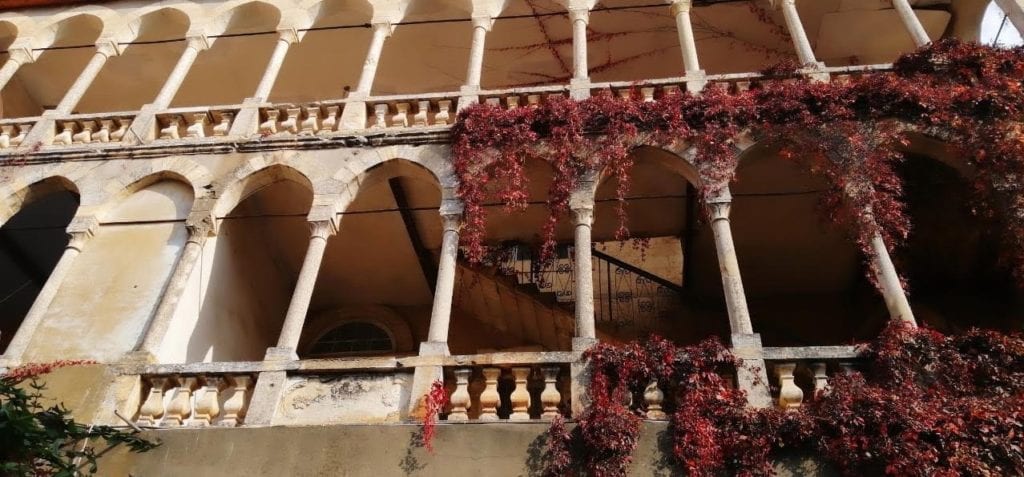

Ali: “The South is a Different Planet”
Ali’s situation is somewhat different from Adam, Khaled and Simon’s, and all those living with HIV, but they are all suffering one way or another on the same level, from the consequences of the curfew, and the long deprivation of the company of friends, with whom they are not forced to wear masks or play the typical roles expected of them with.
Ali, 21 years old, resides in a town in southern Lebanon with a family that cannot accept his sexual orientation, and his attraction to men, so he has to keep it as a secret, and has a job practiced exclusively by men, which helps dismiss doubts about him, and facilitates the process of adapting to his surroundings and avoiding conflicts and headaches.
The thing Ali misses the most is Beirut, and his friends who know his real orientation, in addition to the blessing of moving freely and relaxing after a long workday. He describes the situation by saying, “The society here does not accept anything that has to do with LGBTIQ. Even the “open-minded” parents are totally rigid when this subject is brought up in front of them, even in regards to supporting these people’s rights in existence and expression, so how would it go when you admit you are one of them?”
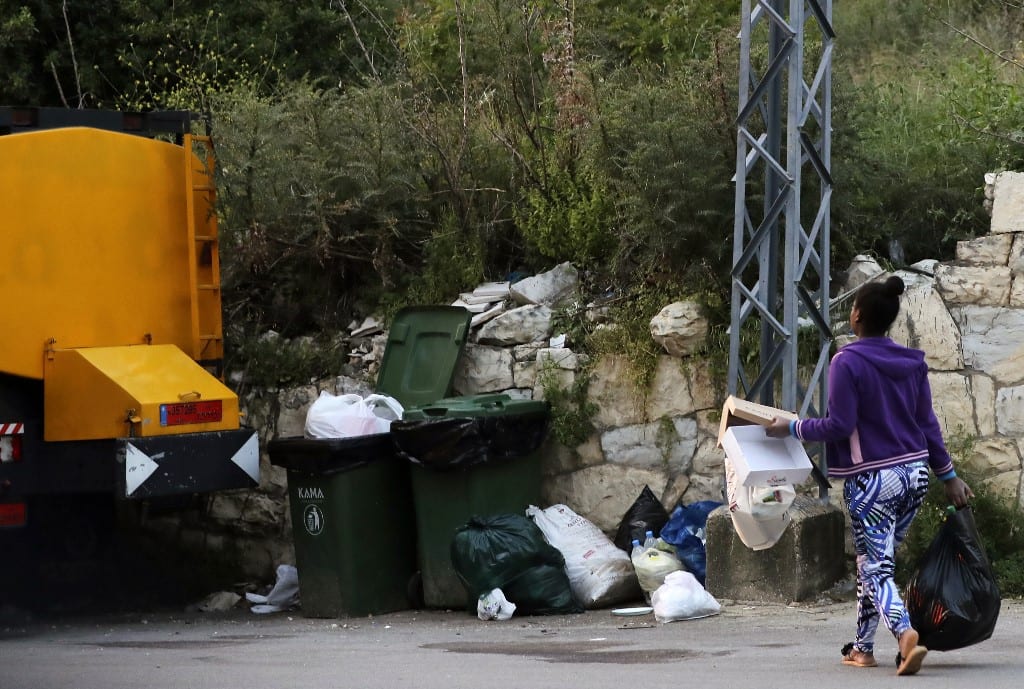

Diana: One of the most bothersome things is having to live with the Kafala system in my parent’s home
Psychotherapist Milad Abu-Joudeh and the activists in the “Helem” association confirm that the majority of the callers during the past few weeks were males, which lead several human rights groups to reinforce programs directed exclusively to women, to reduce the prevalence of male narratives and masculinism over the discussions and speeches of individuals of the LGBTIQ community, and their conditions that intersect with other life issues.
We had spoken with Diana, who does not necessarily suffer from her father’s ignorance of her sexual and emotional orientation, nor of her relatives’ homophobic comments, as much as she suffers from going back to the standard family life that confuses her, since domestic chores has become one of its main characteristics. The irony is that Diana is one of the activists who goes through difficult daily struggles with her colleagues in normal times, in order to annul the Kafala system, and eradicate the patriarchal culture, but now she is living in a home that exploits the Kafala system.
After 10 years of independence, Diana returned to her family’s home in one of the towns of Mount Lebanon, waiting to travel again to carry on with her life and education.
In the garden, she sees a vital space for relaxing at times, and mingling with relatives at other times. Diana started mingling on purpose, seeing it as an opportunity to rediscover her family and create new paths for communication with the people whom she did not have intimate relations with before, and cultivate smooth discussion and expression habits.
“We did not dispute or fight, me and my family,” she explained to Daraj, “but at the same time we were not really close to each other.” She added that not all of her attempts to approach them succeeded. She runs out of energy sometimes, “because I cannot bear home’s atmosphere all the time”. She is on the edge between deepening her relations or running away from them at the same time.
Writing, in addition to going to the garden and communicating with her friends, is what relieves her, as well as working on her project; getting to know her family more based on her “adult” personality, that has become more independent and clear.
“I deal with them on that level. I no longer want my relationship with them to be based on my being the child and they being the parents”.
With this sentence, Diana summarizes the need of almost all to whom we spoke.
All they want today is for everyone to stop considering themselves “fathers or mothers”, and to stop treating them as children, or rather “defected” children, and to confess, once and for all, that they have the right to existence, work and residence.
What is the first thing you want to do the moment they announce that quarantine is over, Simon?
“I want to leave my home.”
To share your story with the effects of isolation and corona virus, contact info@daraj.media






